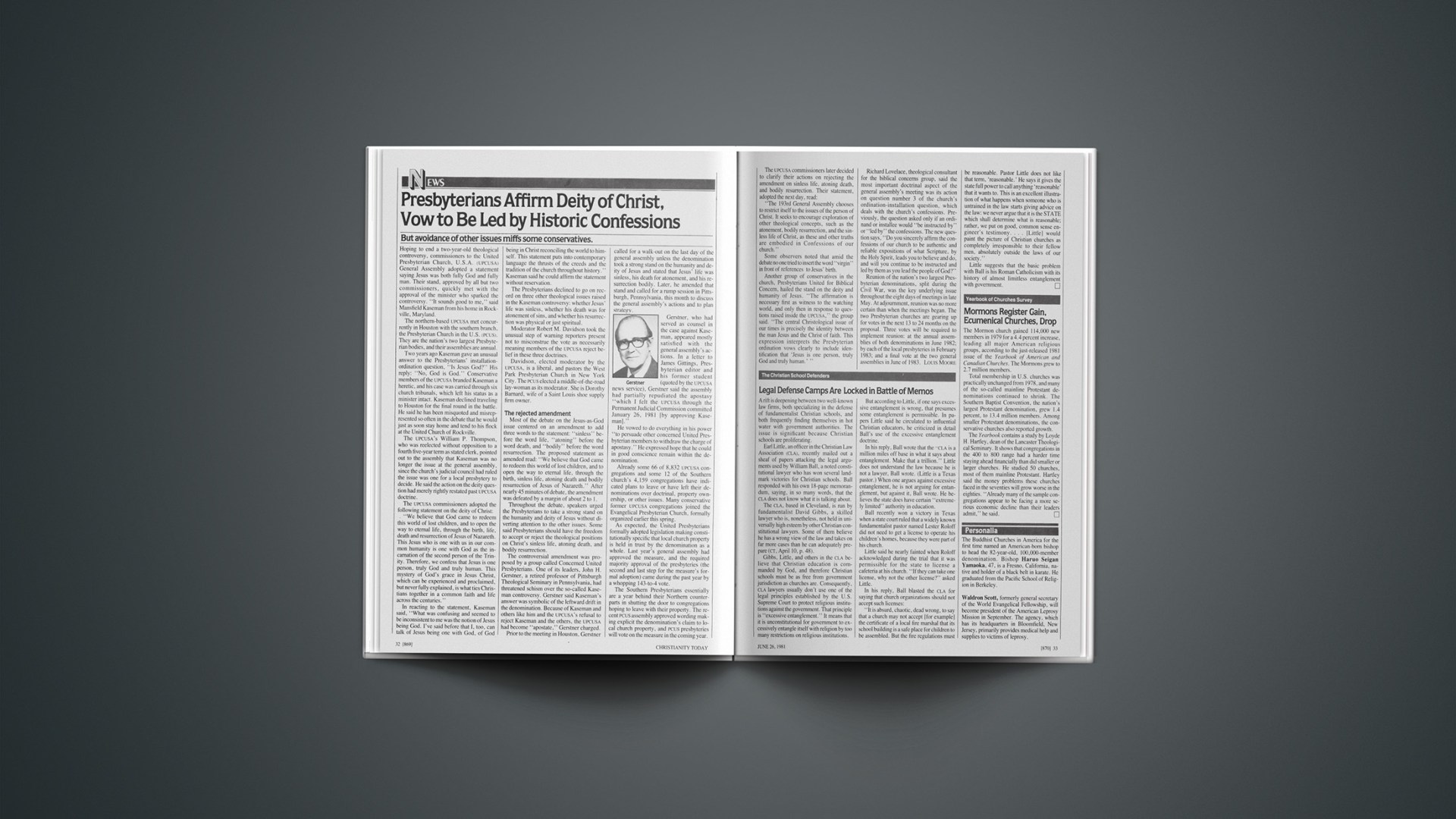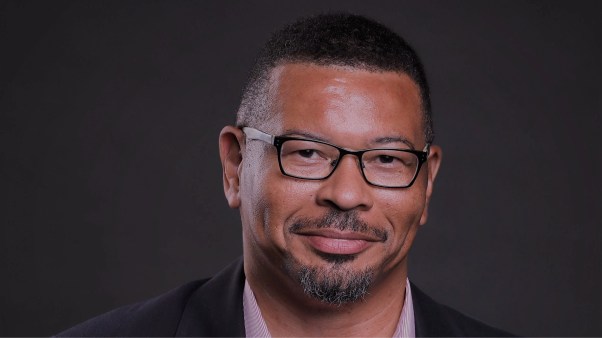But avoidance of other issues miffs some conservatives.
Hoping to end a two-year-old theological controversy, commissioners to the United Presbyterian Church, U.S.A. (UPCUSA) General Assembly adopted a statement saying Jesus was both fully God and fully man. Their stand, approved by all but two commissioners, quickly met with the approval of the minister who sparked the controversy. “It sounds good to me,” said Mansfield Kaseman from his home in Rockville, Maryland.
The northern-based UPCUSA met concurrently in Houston with the southern branch, the Presbyterian Church in the U.S. (PCUS). They are the nation’s two largest Presbyterian bodies, and their assemblies are annual.
Two years ago Kaseman gave an unusual answer to the Presbyterians’ installation-ordination question, “Is Jesus God?” His reply: “No, God is God.” Conservative members of the UPCUSA branded Kaseman a heretic, and his case was carried through six church tribunals, which left his status as a minister intact. Kaseman declined traveling to Houston for the final round in the battle. He said he has been misquoted and misrepresented so often in the debate that he would just as soon stay home and tend to his flock at the United Church of Rockville.
The UPCUSA’s William P. Thompson, who was reelected without opposition to a fourth five-year term as stated clerk, pointed out to the assembly that Kaseman was no longer the issue at the general assembly, since the church’s judicial council had ruled the issue was one for a local presbytery to decide. He said the action on the deity question had merely rightly restated past UPCUSA doctrine.
The UPCUSA commissioners adopted the following statement on the deity of Christ:
“We believe that God came to redeem this world of lost children, and to open the way to eternal life, through the birth, life, death and resurrection of Jesus of Nazareth. This Jesus who is one with us in our common humanity is one with God as the incarnation of the second person of the Trinity. Therefore, we confess that Jesus is one person, truly God and truly human. This mystery of God’s grace in Jesus Christ, which can be experienced and proclaimed, but never fully explained, is what ties Christians together in a common faith and life across the centuries.”
In reacting to the statement, Kaseman said, “What was confusing and seemed to be inconsistent to me was the notion of Jesus being God. I’ve said before that I, too, can talk of Jesus being one with God, of God being in Christ reconciling the world to himself. This statement puts into contemporary language the thrusts of the creeds and the tradition of the church throughout history.” Kaseman said he could affirm the statement without reservation.
The Presbyterians declined to go on record on three other theological issues raised in the Kaseman controversy: whether Jesus’ life was sinless, whether his death was for atonement of sins, and whether his resurrection was physical or just spiritual.
Moderator Robert M. Davidson took the unusual step of warning reporters present not to misconstrue the vote as necessarily meaning members of the UPCUSA reject belief in these three doctrines.
Davidson, elected moderator by the UPCUSA, is a liberal, and pastors the West Park Presbyterian Church in New York City. The PCUS elected a middle-of-the-road lay-woman as its moderator. She is Dorothy Barnard, wife of a Saint Louis shoe supply firm owner.
The Rejected Amendment
Most of the debate on the Jesus-as-God issue centered on an amendment to add three words to the statement: “sinless” before the word life, “atoning” before the word death, and “bodily” before the word resurrection. The proposed statement as amended read: “We believe that God came to redeem this world of lost children, and to open the way to eternal life, through the birth, sinless life, atoning death and bodily resurrection of Jesus of Nazareth.” After nearly 45 minutes of debate, the amendment was defeated by a margin of about 2 to 1.
Throughout the debate, speakers urged the Presbyterians to take a strong stand on the humanity and deity of Jesus without diverting attention to the other issues. Some said Presbyterians should have the freedom to accept or reject the theological positions on Christ’s sinless life, atoning death, and bodily resurrection.
The controversial amendment was proposed by a group called Concerned United Presbyterians. One of its leaders, John H. Gerstner, a retired professor of Pittsburgh Theological Seminary in Pennsylvania, had threatened schism over the so-called Kaseman controversy. Gerstner said Kaseman’s answer was symbolic of the leftward drift in the denomination. Because of Kaseman and others like him and the UPCUSA’s refusal to reject Kaseman and the others, the UPCUSA had become “apostate,” Gerstner charged.
Prior to the meeting in Houston. Gerstner called for a walk-out on the last day of the general assembly unless the denomination took a strong stand on the humanity and deity of Jesus and stated that Jesus’ life was sinless, his death for atonement, and his resurrection bodily. Later, he amended that stand and called for a rump session in Pittsburgh, Pennsylvania, this month to discuss the general assembly’s actions and to plan strategy.
Gerstner, who had served as counsel in the case against Kaseman, appeared mostly satisfied with the general assembly’s actions. In a letter to James Gittings, Presbyterian editor and his former student Gerstner (quoted by the UPCUSA news service), Gerstner said the assembly had partially repudiated the apostasy “which I felt the UPCUSA through the Permanent Judicial Commission committed January 26, 1981 [by approving Kaseman].”
He vowed to do everything in his power “to persuade other concerned United Presbyterian members to withdraw the charge of apostasy.” He expressed hope that he could in good conscience remain within the denomination.
Already some 66 of 8,832 UPCUSA congregations and some 12 of the Southern church’s 4,159 congregations have indicated plans to leave or have left their denominations over doctrinal, property ownership, or other issues. Many conservative former UPCUSA congregations joined the Evangelical Presbyterian Church, formally organized earlier this spring.
As expected, the United Presbyterians formally adopted legislation making constitutionally specific that local church property is held in trust by the denomination as a whole. Last year’s general assembly had approved the measure, and the required majority approval of the presbyteries (the second and last step for the measure’s formal adoption) came during the past year by a whopping 143-to-4 vote.
The Southern Presbyterians essentially are a year behind their Northern counterparts in shutting the door to congregations hoping to leave with their property. The recent PCUS assembly approved wording making explicit the denomination’s claim to local church property, and PCUS presbyteries will vote on the measure in the coming year.
The UPCUSA commissioners later decided to clarify their actions on rejecting the amendment on sinless life, atoning death, and bodily resurrection. Their statement, adopted the next day, read:
“The 193rd General Assembly chooses to restrict itself to the issues of the person of Christ. It seeks to encourage exploration of other theological concepts, such as the atonement, bodily resurrection, and the sinless life of Christ, as these and other truths are embodied in Confessions of our church.”
Some observers noted that amid the debate no one tried to insert the word “virgin” in front of references to Jesus’ birth.
Another group of conservatives in the church, Presbyterians United for Biblical Concern, hailed the stand on the deity and humanity of Jesus. “The affirmation is necessary first as witness to the watching world, and only then in response to questions raised inside the UPCUSA,” the group said. “The central Christological issue of our times is precisely the identity between the man Jesus and the Christ of faith. This expression interprets the Presbyterian ordination vows clearly to include identification that ‘Jesus is one person, truly God and truly human.’ ”
Richard Lovelace, theological consultant for the biblical concerns group, said the most important doctrinal aspect of the general assembly’s meeting was its action on question number 3 of the church’s ordination-installation question, which deals with the church’s confessions. Previously, the question asked only if an ordinand or installee would “be instructed by” or “led by” the confessions. The new question says, “Do you sincerely affirm the confessions of our church to be authentic and reliable expositions of what Scripture, by the Holy Spirit, leads you to believe and do, and will you continue to be instructed and led by them as you lead the people of God?”
Reunion of the nation’s two largest Presbyterian denominations, split during the Civil War, was the key underlying issue throughout the eight days of meetings in late May. At adjournment, reunion was no more certain than when the meetings began. The two Presbyterian churches are gearing up for votes in the next 13 to 24 months on the proposal. Three votes will be required to implement reunion: at the annual assemblies of both denominations in June 1982; by each of the local presbyteries in February 1983; and a final vote at the two general assemblies in June of 1983.
LOUIS MOORE
The Christian School Defenders
Legal Defense Camps Are Locked In Battle Of Memos
A rift is deepening between two well-known law firms, both specializing in the defense of fundamentalist Christian schools, and both frequently finding themselves in hot water with government authorities. The issue is significant because Christian schools are proliferating.
Earl Little, an officer in the Christian Law Association (CLA), recently mailed out a sheaf of papers attacking the legal arguments used by William Ball, a noted constitutional lawyer who has won several landmark victories for Christian schools. Ball responded with his own 18-page memorandum, saying, in so many words, that the CLA does not know what it is talking about.
The CLA, based in Cleveland, is run by fundamentalist David Gibbs, a skilled lawyer who is, nonetheless, not held in universally high esteem by other Christian constitutional lawyers. Some of them believe he has a wrong view of the law and takes on far more cases than he can adequately prepare (CT, April 10, p. 48).
Gibbs, Little, and others in the CLA believe that Christian education is commanded by God, and therefore Christian schools must be as free from government jurisdiction as churches are. Consequently, CLA lawyers usually don’t use one of the legal principles established by the U.S. Supreme Court to protect religious institutions against the government. That principle is “excessive entanglement.” It means that it is unconstitutional for government to excessively entangle itself with religion by too many restrictions on religious institutions.
But according to Little, if one says excessive entanglement is wrong, that presumes some entanglement is permissible. In papers Little said he circulated to influential Christian educators, he criticized in detail Ball’s use of the excessive entanglement doctrine.
In his reply, Ball wrote that the “CLA is a million miles off base in what it says about entanglement. Make that a trillion.” Little does not understand the law because he is not a lawyer, Ball wrote. (Little is a Texas pastor.) When one argues against excessive entanglement, he is not arguing for entanglement, but against it, Ball wrote. He believes the state does have certain “extremely limited” authority in education.
Ball recently won a victory in Texas when a state court ruled that a widely known fundamentalist pastor named Lester Roloff did not need to get a license to operate his children’s homes, because they were part of his church.
Little said he nearly fainted when Roloff acknowledged during the trial that it was permissible for the state to license a cafeteria at his church. “If they can take one license, why not the other license?” asked Little.
In his reply, Ball blasted the CLA for saying that church organizations should not accept such licenses:
“It is absurd, chaotic, dead wrong, to say that a church may not accept [for example] the certificate of a local fire marshal that its school building is a safe place for children to be assembled. But the fire regulations must be reasonable. Pastor Little does not like that term, ‘reasonable.’ He says it gives the state full power to call anything ‘reasonable’ that it wants to. This is an excellent illustration of what happens when someone who is untrained in the law starts giving advice on the law: we never argue that it is the STATE which shall determine what is reasonable; rather, we put on good, common sense engineer’s testimony.… [Little] would paint the picture of Christian churches as completely irresponsible to their fellow men, absolutely outside the laws of our society.”
Little suggests that the basic problem with Ball is his Roman Catholicism with its history of almost limitless entanglement with government.
Yearbook of Churches Survey
Mormons Register Gain, Ecumenical Churches, Drop
The Mormon church gained 114,000 new members in 1979 for a 4.4 percent increase, leading all major American religious groups, according to the just-released 1981 issue of the Yearbook of American and Canadian Churches. The Mormons grew to 2.7 million members.
Total membership in U.S. churches was practically unchanged from 1978, and many of the so-called mainline Protestant denominations continued to shrink. The Southern Baptist Convention, the nation’s largest Protestant denomination, grew 1.4 percent, to 13.4 million members. Among smaller Protestant denominations, the conservative churches also reported growth.
The Yearbook contains a study by Loyde H. Hartley, dean of the Lancaster Theological Seminary. It shows that congregations in the 400 to 800 range had a harder time staying ahead financially than did smaller or larger churches. He studied 50 churches, most of them mainline Protestant. Hartley said the money problems these churches faced in the seventies will grow worse in the eighties. “Already many of the sample congregations appear to be facing a more serious economic decline than their leaders admit,” he said.
Personalia
The Buddhist Churches in America for the first time named an American-born bishop to head the 82-year-old, 100,000-member denomination. Bishop Haruo Seigan Yamaoka. 47, is a Fresno, California, native and holder of a black belt in karate. He graduated from the Pacific School of Religion in Berkeley.
Waldron Scott, formerly general secretary of the World Evangelical Fellowship, will become president of the American Leprosy Mission in September. The agency, which has its headquarters in Bloomfield, New Jersey, primarily provides medical help and supplies to victims of leprosy.
Bread for the World
Agency Lobbies Government On Behalf Of The Hungry
About everyone agrees that world hunger is a serious problem. Learning of starving Somalis, refugee camp Cambodians, and other hungry peoples, evangelical Christians have donated millions of dollars to various relief agencies.
The New York City-based Bread for the World encourages church-supported relief operations. But the self-described “Christian citizens’ movement” believes a more effective approach is to influence government policies. That thinking prompted the introduction of its so-called hunger and global security bill, a multipronged measure now being considered in both houses of Congress.
Among other things, the bill would establish measures insuring that foreign aid actually reaches the needy, and that the recipient government follows through with “self-help” programs for those peoples.
The bill was introduced in the House of Representatives by Stephen Solarz (D-N.Y.) and Benjamin Gilman (R-N.Y.), and was to be introduced in a slightly modified form earlier this month in the Senate by Mark Hatfield (R-Oreg.), a BFW board member and long-time hunger activist.
Hatfield legislative aide Rick Rolf said the bill is being well received, both by conservatives, who sometimes oppose foreign aid as “global welfarism,” and by progressives, who oppose any cutbacks in assistance to underdeveloped nations.
BFW leaders say Christians have a biblical responsibility to feed the hungry, and that U.S. Christians ought to be good “stewards” of their opportunity to participate in the governmental process.
Hunger and poverty are chief causes of U.S. and world unrest, says BFW, so that U.S. and the world’s security are threatened if the hungry are not fed. This logic is central to BFW, and particularly explains its hunger and global security bill.
Missouri Synod Lutheran pastor Arthur Simon, 41, organized BFW in the early 1970s. He became concerned about the hunger problem while pasturing Trinity Lutheran Church on Manhattan’s lower east side.
Simon then began meeting with a dozen or so interested Protestant and Catholic church leaders in New York City. Out of those meetings emerged the idea and reality of BFW. A first membership drive in 1974 netted 3,000 members, and numbers have since grown to the present 37,000.
Leaders decided they would combat hunger in the public policy, or legislative, sector. “Part of our idea from the start was to be consciously and explicitly Christian and not to deviate from that,” added Simon.
BFW estimates that 455 million people in the world are permanently hungry—that is, not getting enough calories or protein to make possible a normal, active life.
The group hasn’t grabbed the publicity of either New Right or left-wing church groups. However, its track record shows results. The group drafted, then mobilized public support for congressionally approved “right-to-food” resolutions, which acknowledged the right of everyone to a nutritionally adequate diet. The interfaith group also pushed legislation for a U.S. grain reserve program, prodding Congress toward establishing two such reserves.
A Mixed Feedbag?
Simon and others say some religious conservatives dismiss BFW as “liberal.” These critics note that former World Council of Churches general secretary Eugene Carson Blake was BFW’s first board president, and that its current president is Roman Catholic Bishop Thomas J. Gumbleton of Detroit.
Of this kind of criticism, long-time BFW supporter Frank Gaebelein, headmaster emeritus of the Stony Brook School and former coeditor of CHRISTIANITY TODAY, comments:
“I often walk on the trails along the Potomac River,” said the Arlington. Virginia, resident. “Let’s say I meet another hiker and we start talking. Suddenly, there is a cry from the river where a man has overturned in his canoe. I don’t stop and ask my friend what he believes about the Second Coming or Scripture. No, I ask him to go with me and help.”
A number of prominent evangelicals are sprinkled among the mainstream and secular-oriented board members. These include Seattle Pacific University president David L. McKenna, Mennonite educator Myron Augsburger, and evangelist Tom Skinner. Another board member, Evangelicals for Social Action president Ron Sider, has just written a biblical study of hunger for BFW.
Gaebelein and others have said they respect BFW for its accurate and objective information on world hunger. The group provides background papers on hunger issues, and keeps its members informed on upcoming congressional action on hunger-related issues and on the voting records of congressman on hunger issues. Simon’s book, Bread for the World, won a national religion book award in 1976, and is regarded by many as definitive on the subject of global poverty.
BFW has two arms: a tax-exempt educational fund, and a non-tax-exempt lobbying arm. It has members in every congressional district, and workers who organize and inform them, BFW’s full-time staff of 30 includes teams of issues analysts in both New York City and Wasington, D.C.
The group enlists support from local churches (although it has only individuals as members), which join its “covenant” program. These churches hold an annual “offering of letters”—usually at Thanksgiving—when parishioners are asked to fill the plate with letters to their congressmen on a key hunger issue. This year it is the hunger and global security bill.
BFW tries to keep things simple on a relatively small $900,000 annual budget, and the sparse office furnishings bear that out. Staff members are paid according to need, not rank, so that the average per-person salary of $12,500 is small, especially by New York City standards.
BFW tries to correct what it believes are popular misconceptions about aid to the hungry. For instance, many criticize abuses of the food stamp program, but BFW statistics show that only 12 percent of the people who receive food stamps could work but don’t, and that fraud is about 4 percent, BFW acknowledges that, yes, the U.S. does give more foreign aid dollars than anyone else. This aid, however, constitutes about one-fifth of 1 percent of the gross national product. This “tithe” puts the U.S. sixteenth in a list of 17 major donor nations.
The hunger and global security bill’s parts will be considered in various congressional committees. The bill works from the premise that the U.S. would make hunger the focus of its relationships with the developing countries during this decade. Its features include:
• Foreign aid: proposed additional funding to private groups doing health work in poor countries; measures insuring that food sold to foreign governments on easy terms under the Food for Peace Title I program would go primarily to the needy, and setting verifiable “self-help” measures for the poor; and requirements that multilateral development banks, such as the World Bank, provide that a certain proportion of lending benefit people whose incomes are at or below the subsistence level.
• World food security: proposal that any food financing would benefit primarily those in the most need; that U.S. negotiations with other grain-exporting countries for the establishment of emergency grain reserves would complement those in the U.S.; and prohibition of grain embargoes in cases where people would go hungry.
• Trade reforms: proposed modifications in the General System of Preferences, five-year-old legislation granting duty-free status on selected imports from developing countries. These measures would help the least-developed developing countries rather than those advancing.
Do Congressmen react differently to overtures from a “Christian” lobbyist group than a secular one? Not really, says issues analyst Paul Nelson of BFW’s Washington office, while noting that certain Christian congressmen probably have more affinity for BFW. What does make congressmen receptive to visits from BFW lobbyists is if they have already been contacted back home by grassroots BFW members, he says.
JOHN MAUST
North American Scene
The Reagan administration earlier this month pledged its support for tuition tax credits for students attending private schools and colleges. A bill introduced by Senate taxation subcommittee chairmen Patrick Moynihan (D-N.Y.) and Robert Packwood (R-Oreg.) would allow a 50 percent tax credit for private school tuition and fees, with a maximum of $250 the first year and $500 after that. (Unlike a deduction, a tax credit is a direct subtraction from taxes due.) Still, some Capitol Hill officials doubted chances for the bill’s passage. A coalition of education and civil-rights groups recently formed to oppose the tax credits, and American Civil Liberties Union activists argue it is an unconstitutional advancement of religion.
Anti-Semitic feelings in the U.S. diminished in recent years, although pockets of prejudice remain, a recent survey showed. Of the 1,200 people interviewed by the Yankelovich, Skelly, and White research firm, 9 percent held “highly anti-Semitic” views. This compared to 19 percent in a similar study in 1964. Problem areas still remain, since about half of the blacks interviewed held anti-Semitic views.
Continuing tensions between Vietnamese and American fishermen on the Gulf coast are being addressed by Texas church leaders. The Texas Council of Churches and Catholic groups are sponsoring programs and promoting dialogue to ease tensions aroused when increased numbers of Vietnamese refugees began entering Gulf coast fishing areas. The peace efforts are intended to overshadow activities of the Ku Klux Klan, which was planning anti-Vietnamese rallies.
The nation’s first all-Muslim community is being built near Abiquiu, New Mexico. The projected 600-member settlement (mostly American converts) has as goal “perpetration” of the Islamic faith, partially through radio and TV stations. At an estimated cost of $10 million over a 7-to-10-year period, the project will include a seven-domed mosque and a boarding school. Funds are reported to be coming from private Saudi Arabian sources. President of the project. Dar al-Islam (“House of Islam”), is Nooridin (formerly Steve) Durkee.
Several church leaders in Rhode Island spoke for a total ban on obscenity on cable TV during public hearings there last month. Public utilities administrator Edward F. Burke, the state’s regulator of cable systems, already had ruled that cable connections must have a “parental guidance” device—a locking switch to prevent children from tuning to some channels. Cable TV obscenity is figured to become a big issue in many areas of the U.S. in the coming decade.
What’s Coming In CT
In the next several issues CHRISTIANITY TODAY will feature:
• CT’s twenty-fifth anniversary issue features an interview with Billy Graham and articles by former editors Carl Henry and Harold Lindsell. Time magazine’s religion editor, Richard Ostling, a former CT news editor, surveys the top stories in religion over the last quarter-century. U.S. Senate Chaplain Richard Halverson writes about “the economy” of the Holy Spirit in today’s churches.
• Other writers look at the years since 1956 for trends in missions, the pastorate, the local church, women’s roles, the arts, and Pentecostalism.
• Eutychus I, Ed Clowney, returns for a repeat performance.










